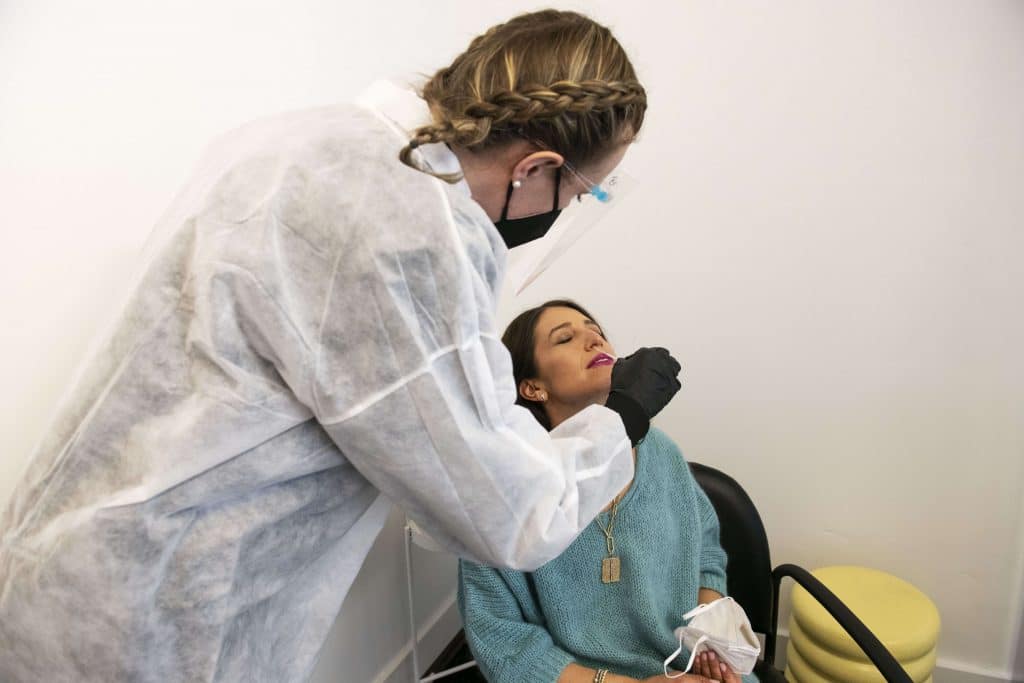Pitkin County COVID-19 cases lower than flu, RSV
But that is expected to change going into the winter season

Kelsey Brunner/The Aspen Times archives
In anticipation of an influx of cases this winter, COVID-19 is currently seeing the lowest numbers locally compared to the flu and Respiratory Syncytial Virus.
“Respiratory illness season has officially begun,” said Carly Senst, Pitkin County Public Health epidemiologist, “and we’re seeing increases in flu and RSV, but Covid is still very low.”
Getting individual case level data is challenging, according to Senst, primarily due to the fact that most people don’t go see a doctor when they get sick and both the flu and RSV are non-reportable unless associated with a hospitalization. Wastewater data is showing that all three illnesses — the flu, RSV, and COVID-19 — are currently circulating at what’s considered “minimal levels,” with the flu and RSV, which are more endemic, spreading through schools, families, and friend groups.
This is following a late summer increase of Covid, which she said is expected to return as the winter season gets into full swing.
“As soon as Thanksgiving hits, we would anticipate a rise in COVID-19 cases,” she said.
According to Senst, Covid is expected to peak in December and January as the valley population swells and activity increases.
“The vibrancy that makes Aspen and Snowmass so wonderful is also what leads to viral spread,” she said.
Pitkin County Public Health’s website also notes, “Pitkin County is uniquely vulnerable to certain types of communicable diseases … due to the high volume of travelers visiting the county.”
RSV has appeared to return to its pre-Covid pattern, meaning it’s back to being more akin to the common cold for both adults and children following an increase in hospitalizations during the pandemic. Senst credited the advent of vaccines for late-term pregnant women and children as a cause of this “dramatic decrease.”
And while influenza is still something that public health monitors for its mutagenic properties, meaning it constantly undergoes mutations as it replicates, she confirmed Covid still presents the most risk to the Pitkin County community.
“COVID-19 continues to be our wild card,” she said. “COVID-19 continues to cause more severe illness, continues to have longer term effects, and continues to pose a wider range of complications.”
She emphasized that vaccines continue to be the best way to mitigate for illness.
“Right now, October, November, even into December, is the best time to get those seasonal respiratory vaccines,” Senst said.
Washing hands is also key to prevent all sicknesses — not just the flu, RSV, and Covid, but the stomach flu, norovirus, and more. And she says that masking up when appropriate, like while traveling and in big crowds, can help an individual protect themselves.
For those who are sick, staying home is necessary to help prevent spread. Those experiencing a fever or gastrointestinal upset should refrain from going to work or going out until up to 48 hours after symptoms begin to improve without the use of medication, according to Senst. For children in school, parents should check school policy about when a sick child should return.
“Respiratory illnesses can be caused by many different types of pathogens, so while severity and treatment of these illnesses will vary, proactive protection is the best way to prevent potential negative health outcomes due to respiratory illnesses,” Pitkin County Public Health’s website states.
Senst also noted that, prior to the MMR vaccine, measles was considered a seasonal illness along with the flu, RSV, and Covid. Conveniently, the best ways to prevent the flu, RSV, and Covid continue to also be the best way to prevent measles.
For more information on prevention and Pitkin County Public Health’s Healthy Best Practices, visit pitkincounty.com/1175/Disease-Prevention.










